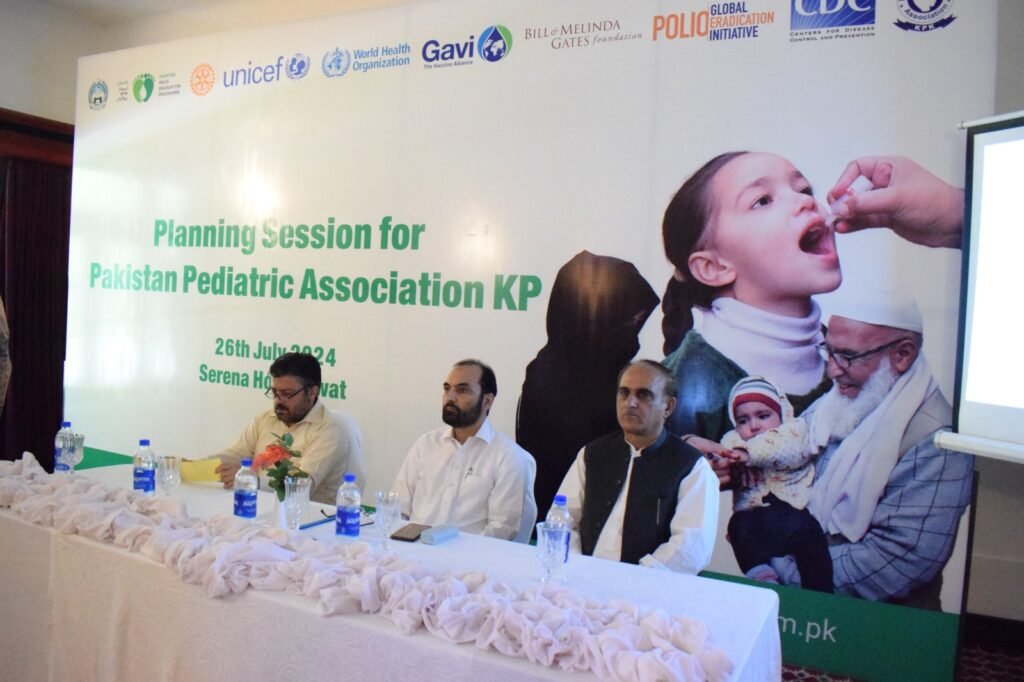SWAT: Emergency Operations Centre (EOC) Khyber Pakhtunkhwa in collaboration with United Nations Children’s Fund (UNICEF) organized a planning workshop along with the provincial chapter of Pakistan Pediatric Association (PPA) to chalk out a joint strategy for overcoming the existing challenges in the eradication of polio virus. The session was attended by cabinet members of PPA and leading pediatricians of Peshawar, Mardan, Kohat, Abbottabad, Swabi, Hangu and all seven districts of Bannu and D.I Khan divisions. The session was chaired jointly by Special Secretary Health and Coordinator of Provincial EOC Abdul Basit and President of the provincial chapter of PPA Professor Dr. Muhammad Hussain while representatives partner organizations UNICEF, WHO and NSTOP were also present on this occasion.

Addressing the session, Special Secretary Health and EOC Coordinator Abdul Basit, said that polio eradication, being a national emergency, is among the top priorities of the government and entire administrative machinery, law enforcement agencies and health department officials are actively participating in the whole process to oversee and manage ground challenges and ensure administration of polio drops to all eligible children.
Abdul Basit explained that in order to tackle the challenge of polio eradication and bridge the gaps in the program, the program has put in place various innovative strategies such as extended outreach activities, ring strategy, bikers’ strategy, Integrated Service Delivery (ISD), Reaching the Unreached (RUR) activity as well as the establishment of health camps which are bearing fruits and enabling the program to get access to those unreachable pockets specially in Bannu and D. I Khan divisions. However, he pointed out, the growing trends of misconceptions about polio vaccines especially in southern and central KP including Peshawar are proving to be a major stumbling block in ensuring the vaccination of all eligible children in vaccination drives.

Highlighting the critical role of pediatricians in supporting the government to protect our children from this crippling disease and achieve the goal of polio free Pakistan, he said that as health professionals especially doctors are a very significant and respected segment of society and people from all walks of life listen to them very seriously and act upon their advises, they can play a pivotal role in shaping the public opinion in favor of polio vaccination and specifically in removing public misconceptions and resistance to polio vaccines. Therefore, he added, the program is focusing on engaging senior doctors, pediatricians, local healthcare providers and clinicians to orient them on the changing program dynamics and challenges with the aim of bringing them on board so as to raise the voice base for polio vaccination and essential immunization through these trusted voices and help remove the misgivings in the communities regarding safety and efficacy of polio vaccination and other essential immunization.

Addressing the session, President of provincial chapter of PPA, Professor Dr. Muhammad Hussain said that Pakistan and Afghanistan are unfortunately the only two countries where the polio virus still exists. He thanked the donors and partner organizations for their support for the eradication of this crippling disease, however, he lamented that a lot of our national resources are also being drained due to regular vaccination against vaccine preventable diseases (VPDs) like polio. On this occasion, he pledged to extend full support on behalf of PPA at the provincial level to address the existing challenges in polio eradication.

Dr. Hafizullah, Team Lead NSTOP, pointed out high risk areas in Bannu and D.I Khan divisions where the most of the children are missed due to misconceptions and requested the participants to extend their support in addressing those misconceptions.
Technical experts of the program including Dr. Irfan Khwaja, Dr. Junaid Khan and Ms. Shadab Younas delivered detailed presentations on the existing operational and communication strategies and achievements of the program and placed the existing challenges including misconceptions about vaccines among the communities before the pediatricians and sought their support to raise risk perception among the communities and remove the existing misconceptions about vaccines.

The forum came up with solid recommendations for addressing the operational and communications challenges. The workshop proved to be a very insightful and interactive session and the participants suggested valuable suggestions and strategies to overcome the existing challenges in operation, communication and surveillance to further improve polio eradication efforts and ensure the eradication of this crippling disease once and for all. Both EOC and PPA agreed in principle to mutually sign a joint communique for addressing the existing challenges in the eradication of this crippling disease.
At the conclusion of the workshop, shields and certificates were distributed among the participants.











